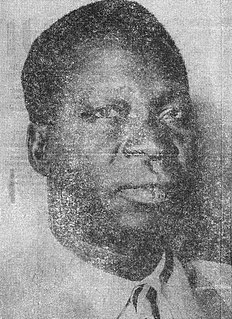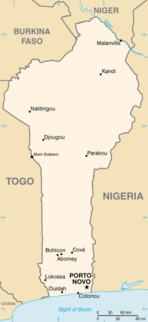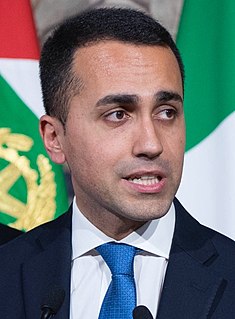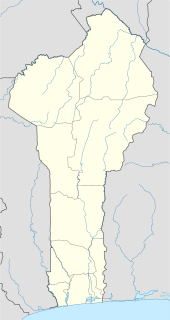
The Legislative Council of the Hong Kong Special Administrative Region or LegCo is the unicameral legislature of the Hong Kong Special Administrative Region of the People's Republic of China.

Sourou-Migan Marcellin Joseph Apithy was a Beninese political figure most active when his country was known as Dahomey. He arose on a political scene where one's power was dictated by what region in Dahomey one lived in.

Coutoucou Hubert Maga was a politician from Dahomey. He arose on a political scene where one's power was dictated by what region in Dahomey one lived in. Born a peasant in 1916, Maga served as a schoolmaster from 1936 to 1945, during which time he gradually gained considerable influence among the uneducated. He was elected to Dahomey's territorial assembly in 1947 and founded the Northern Ethnical Group, later renamed the Dahomey Democratic Rally. In 1951, Maga was elected to the French National Assembly, where he served in various positions, including premier from 1959 to 1960. When Dahomey gained its independence from France on August 1, 1960, Maga was appointed to the presidency, and was officially elected to that post on December 11.

Elections in Benin take place within the framework of a multi-party democracy and a presidential system. Both the President and the National Assembly are directly elected by voters, with elections organised by the Autonomous National Electoral Commission (CENA).
Elections in Thailand refers to the democratic process in which some parts of the Government of Thailand is selected. These include the House of Representatives of Thailand, the Senate of Thailand, local Administrations, Governorship of Bangkok and national referendums. Thailand has so far had 25 general elections since 1933; the last election was in 2014. Voting in elections in Thailand is compulsory. All elections in Thailand are regulated by the Election Commission of Thailand.
Elections in Hungary are held at two levels: general elections to elect the members of the National Assembly and local elections to elect local authorities. European Parliament elections are also held every 5 years.

The 2008 Hong Kong Legislative Council election was held on 7 September 2008 for the 4th Legislative Council since the establishment of the Hong Kong Special Administrative Region. There were 60 seats in the 4th Legislative Council, with 30 members elected by geographical constituencies through direct elections, and 30 members by functional constituencies. Candidates for 14 functional constituency seats were unopposed.

The Politics of Piedmont, Italy takes place in a framework of a presidential representative democracy, whereby the President of Regional Government is the head of government, and of a pluriform multi-party system. Executive power is exercised by the Regional Government. Legislative power is vested in both the government and the Regional Council.

The 2000 Hong Kong Legislative Council election was held on 10 September 2000 for members of the 2nd Legislative Council (LegCo) of the Hong Kong Special Administrative Region (HKSAR). The election returned 24 members from directly elected geographical constituencies, 6 seats from the Election Committee constituency and 30 members from functional constituencies, of which 9 uncontested.
An election to the County Council of London took place on 5 March 1910. It was the eighth triennial election of the whole Council. The size of the council was 118 councillors and 19 aldermen. The councillors were elected for electoral divisions corresponding to the parliamentary constituencies that had been created by the Representation of the People Act 1884. There were 57 dual member constituencies and one four member constituency. The Council was elected by First Past the Post with each elector having two votes in the dual member seats.

The 1991 Hong Kong Legislative Council election was held for members of the Legislative Council of Hong Kong (LegCo). The election of the members of functional constituencies was held on 12 September 1991 and the election of geographical constituency seats was held on 15 September respectively. It was the first ever direct election of the Legislative Council in Hong Kong history. There were 18 members from directly elected Geographical Constituencies, 21 members from Functional Constituencies, 17 members appointed by the Governor, and 3 official members.

Legislative elections took place on 10 and 17 June 2012 to select the members of the 14th National Assembly of the French Fifth Republic – a little over a month after the French presidential election run-off held on 6 May.

The Presidential Council was a triumvirate system of government in the Republic of Dahomey from 7 May 1970 until 26 October 1972. The Presidential Council included Hubert Maga, Justin Ahomadégbé-Tomêtin, and Sourou-Migan Apithy as equal members of a council which held all legislative and executive power in the state of Dahomey.

Administrative Council elections were held in Dahomey for the first time in 1925.

Administrative Council elections were held in Dahomey in 1932.

Administrative Council elections were held in Dahomey in 1934.

Administrative Council elections were held in Dahomey in 1936.

Administrative Council elections were held in Dahomey in 1930.

The next Italian general election is due to be held no later than 28 May 2023.














